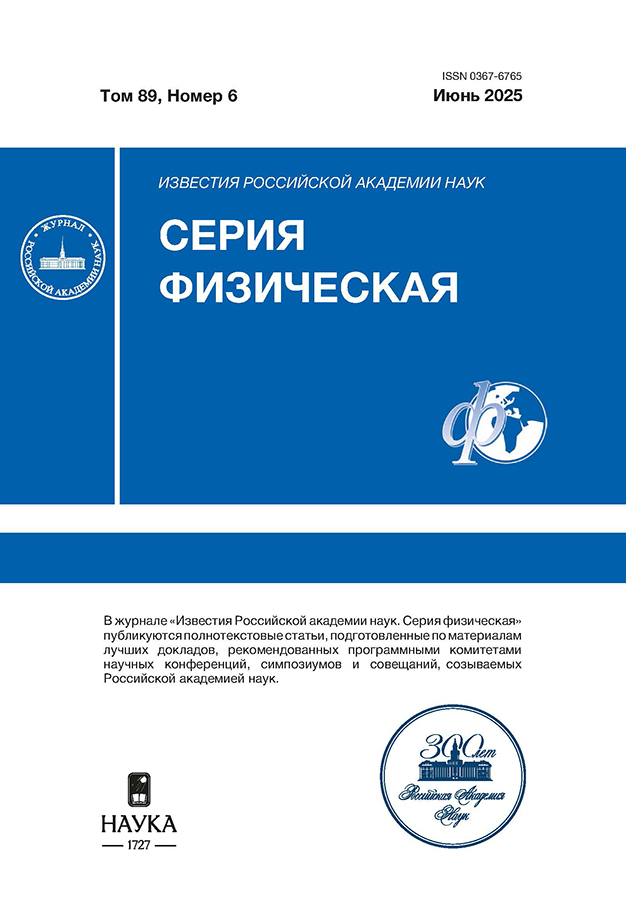A novel type of silicone rubber-based scintillator for extensive air showers particle detection
- Autores: Kuleshov D.A.1,2, Stenkin Y.V.1,2, Kurinov K.O.1, Maliy I.O.1,2
-
Afiliações:
- Institute for Nuclear Research of the Russian Academy of Sciences
- Moscow Institute of Physics and Technology (National Research University)
- Edição: Volume 89, Nº 6 (2025)
- Páginas: 999-1002
- Seção: Physics of Cosmic Rays
- URL: https://transsyst.ru/0367-6765/article/view/692839
- DOI: https://doi.org/10.31857/S0367676525060329
- ID: 692839
Citar
Texto integral
Resumo
We proposed to use new inexpensive specialized scintillators optimized for different types of particles in experiments of detecting extensive air showers. The scintillators developed in our laboratory are based on locally produced phosphors immersed in a compound — optically transparent silicone rubber, so we called them "silicone rubber-based scintillators". Some of the first versions of such scintillators are already successfully used to register thermal neutrons and cascade particles in a number of Extensive Air Showers arrays created with our participation. We show here preliminary results of the development of specialized scintillators of this type to record different particles: fast neutrons, muons, electrons and gamma rays.
Palavras-chave
Sobre autores
D. Kuleshov
Institute for Nuclear Research of the Russian Academy of Sciences; Moscow Institute of Physics and Technology (National Research University)
Email: den_kuleshov481@mail.ru
Moscow, Russia
Yu. Stenkin
Institute for Nuclear Research of the Russian Academy of Sciences; Moscow Institute of Physics and Technology (National Research University)Moscow, Russia
K. Kurinov
Institute for Nuclear Research of the Russian Academy of SciencesMoscow, Russia
I. Maliy
Institute for Nuclear Research of the Russian Academy of Sciences; Moscow Institute of Physics and Technology (National Research University)Moscow, Russia
Bibliografia
- Asada T., Masuda M., Okumura M., and Okuma J. // J. Phys. Soc. Japan. 1959. V. 14. P. 1766.
- Carel W.E. van Eijk // Nucl. Instrum. Meth. A. 2001. V. 460. No. 1. P. 1.
- Yamamoto S., and Tomita H. // Appl. Radiat. Isotop. 2021. V. 168. Art. No. 109527.
- Stenkin Yu.V. // Nuclear Track Detectors: Design, Methods and Applications. Ch. 10. Nova Sci. Publ., 2010. P. 253.
- Громушкин Д.М., Волченко В.И., Петрухин A.A. и др. // Ядерн. физика. 2015. Т. 78. С. 379
- Кузьменкова П.С., Громушкин Д.М., Третьякова Т.Д., Шульженко И.А. // Ядерн. физ. и инжиниринг. 2021. Т. 12. № 1. С. 36
- Щеголев О.Б., Алексеенко В.В., Кулешов Д.А. и др. // Изв. РАН. Сер. физ. 2021. Т. 85. № 4. С. 548
- Стенькин Ю.В., Алексеенко В.В., Кулешов Д.А. и др. // Изв. РАН. Сер. физ. 2022. Т. 86. № 5. С. 758
- Лагуткина А.А., Джаппуев Д.Д., Куджаев А.У. и др. // Изв. РАН. Сер. физ. 2023. Т. 87. № 7. С. 1048
- https://luminophor.ru/catalog/luminofory/radiolyuminofory/stsintillyatory.
Arquivos suplementares










